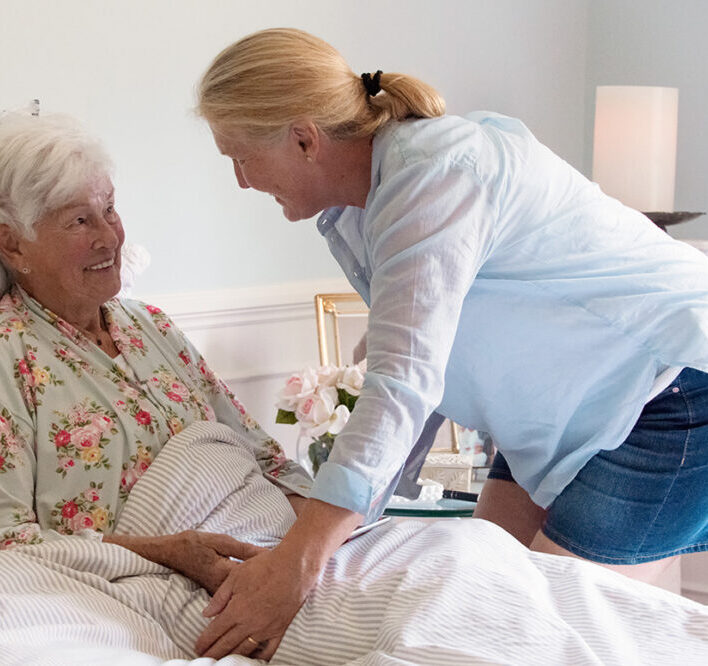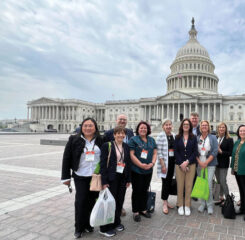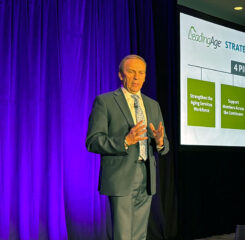LeadingAge Hospice Member Network – May 2022
FY2023 Hospice Wage Index Proposed Rule
LeadingAge staff shared a draft comment letter to the FY2023 Hospice Wage Index Proposed Rule with members. Staff also shared resources for members to craft their own responses including a toolkit outlining best practices for responding to rules and an online “action alert” where members could submit specific comments on the request for information on health equity. Joe Franco, Vice President of Grassroots and Earm Abbasi, LTSS Public Policy Analyst also joined the call to discuss the importance of individual member comments on rulemaking. Writing comments which include specific details on the impact of regulations on member agencies is very important. When CMS reviews comment letters, if the content is the same letter to letter, those letters will count as a single comment. However, when comments that are more detailed and include agency specific information those letters will be counted individually. Federal agencies have told LeadingAge in the past that specific examples of regulatory impacts are more important than mass comments that restate the same information. Comments on the Hospice Wage Index Proposed Rule are due Tuesday, May 31st.
Hospice Member Introductions
Given the newness of the Hospice Member Network, the group took time during this meeting to introduce themselves, their organizations, the communities they serve, and interesting partnerships or programs at their agency. Below is a snapshot of LeadingAge Hospice Member Network participants:
- The median home health census was 100 patients with some smaller and larger outliers;
- Half of the agencies were associated with a life plan community or senior living campuses which have been working to grow their census and expand to their surrounding communities;
- Several shared interest in the Value Based Insurance Design model and what was next for hospice in Medicare Advantage;
- Others shared hiring staff was a barrier to growth of their hospice, especially competing with travel nurse salaries;
- Many also shared concerns with the growth of competition in their markets, several were competing with more than 100 other hospices;
- Interesting partnerships and programs included an acupuncturist pain control pilot, advanced illness management and home health palliative care models, outreach to community churches for education, work with a palliative neurologist for dementia patients, a pet therapy program, and cultural competency program for Russian, Chinese, and Latino patients;
- Many members shared innovative grief programs including elementary and school district wide grief programs, supporting staff on CCRC campuses with the loss of residents, as well as children and family bereavement camps.
Nearly all members shared comprehensive grief support programs, supporting not only hospice beneficiaries but entire communities. The group discussed what support was lacking at the federal level for grief support programs and ways LeadingAge could advocate for federal legislation to support grief work. Members shared that any opportunity to help fund for activities like grief camps that require food, lodging, and crafts for children would be incredibly helpful. Currently, most members apply for grant funding to support these essential, and often free community programs. Members also mentioned the need to support personnel training.
Policy Update
CMS Conditions of Participation: LeadingAge staff met with members of the hospice Quality Safety and Oversight Group to discuss current waivers and the implementation of the new hospice survey process. At this time, there are no plans to make any other 1135 waivers permanent. LeadingAge is working to follow up with payment policy staff to discuss face-to-face and routine home care telehealth waivers. The CMS team did stress that providers not impacted by the Public Health Emergency (PHE) issues should be transition back to regular Conditions of Participation (CoPs), the message was do not take advantage. One specific waiver staff highlighted was the volunteers waivers; this waiver has not ended, but staff recommended hospices start building those programs back up so they are in time to meet 5% volunteer requirements when waivers end. There are four 1135 waivers for in-patient hospices that will terminate June 4th. The administration will communicate in advance but with the community infection rates moving back up not sure when that decision might happen. With the termination of the PHE there will be a transition period to the origional CoPs possibly 60 days after the end of the PHE to reinstate. Staff also shared that they are going to announce the technical expert panel (TEP) for the special focus program for hospice surveys. If any LeadingAge members are interested in being nominated for that TEP they can reach out to Katy Barnett (kbarnett@leadingage.org) for a letter of support.
CMMI and Palliative Care: LeadingAge met with CMMI to discuss how to incorporate palliative care into other models of care that currently exist such as ACOs including what incentives would be needed to recruit palliative care providers. CMMI is interested in focusing on integrating palliative care into larger models rather than introducing new models focused exclusively on palliative care. LeadingAge is also working with the Value Based Insurance Design team regarding the hospice component and will continue to update members as that work advances.
COVID Relief and Economic Package: On the legislative front, staff were waiting to see what Congress did around COVID relief. Congress was still having trouble coming to agreement on paying for any additional relief. There was also ongoing work on some sort of economic recovery package that included workforce and home and community-based services funding.
Action Campaign: To support ongoing COVID and economic relief efforts, staff urged members to take action on two action alerts: Ask Congress to Pass More COVID-19 Funding and Expand and Protect Funding for Older Americans
Appropriations: Appropriation season was in full swing, and more action will be needed with the bills move in the summer. While there were not any specific home health asks, substantive program changes can often be attached to these appropriations bill near the end of the process. LeadingAge will continue to monitor the process and report back to members.

Most Recommended
February 29, 2024
Say Yes to Lobby Day!
April 05, 2024
Cyberattack Updates: Change Healthcare Payment Platform
March 27, 2024
 Colleagues on the Move, March 27, 2024
Colleagues on the Move, March 27, 2024
April 12, 2024
Improving Medicare Advantage
Recently Added
April 17, 2024



